Pews vs. Passports: Who’s Leaving the Country—and Who Isn’t
Does Religion Have Anything to Do With Something Like International Travel?
This post has been unlocked through a generous grant from the Lilly Endowment for the Association of Religion Data Archives (ARDA). The graphs you see here use data that is publicly available for download and analysis through link(s) provided in the text below.
Here’s a stat that, to this day, I still can’t quite believe: the share of Americans who had a passport was 5% in 1990. According to data from 2023, that had risen to 48%. Maybe it’s because I grew up in a small town in rural southern Illinois and have lived in this part of the country my entire life, but there’s just no way I believe that half of Americans have a passport.
If I had to hazard a guess, I’d bet 30% of folks living within fifty miles of my house have a passport. Honestly, that’s probably overly optimistic. But the sparsely populated Midwest is certainly not indicative of how much traveling happens in places like New York City or Seattle. This is what I love about data, by the way: it forces us outside our own bubble and reminds us that our immediate surroundings don’t represent the entire country.
I’m telling you all this to preface a really fun survey question from Pew’s American Trends Panel, Wave 124, hosted by the Association of Religion Data Archives. It’s a pretty simple one: “How many countries have you traveled to outside the United States?” The response options ranged from none to 10 or more. Here’s how the entire sample answered that question compared to the five religious traditions in the data.
Well, this data really does dovetail with that information from the State Department about the share of Americans with passports. Among those who took the survey, just 23% said they had never visited a foreign country. In total, 41% of Americans had visited no more than one country outside the United States. On the other hand, 27% had visited at least five countries. That’s quite a large share of Americans who have traveled extensively.
When I break it down by religious group, some noticeable patterns emerge. For instance, 29% of evangelicals had not left the United States, and only 21% had visited at least five foreign countries. From this angle, evangelicals are the least likely to travel outside the country.
But just using this single bit of data, I don’t know if I can definitively tell you which religious traditions are the most well-traveled, though. Catholics are the least likely to report “none” for the number of foreign countries visited. But only 27% had visited at least five—below the “Something Else” category, which includes groups like Muslims, Buddhists, Latter-day Saints, etc.
How about another key metric of religiosity—attendance?
If I had to hazard a guess about the relationship between religious attendance and international travel, I would have posited that folks who spend a lot of time in houses of worship may be so busy with those activities that they don’t have many openings in their schedules to leave the country. Meanwhile, the never-attenders (who tend to be more politically liberal) might have more opportunities to travel overseas.
But the data does not confirm that hypothesis. Instead, it’s the never-attenders who are most likely not to leave the country—27% chose the “none” option—compared to 25% who had visited at least five countries outside the United States. Among folks who said they attend church weekly, 31% were in the “frequent traveler” category, the highest of any level of religious attendance.
Taken together, it seems like the monthly or weekly attenders are the most well-traveled. You can clearly see that for people who attend worship services multiple times per week, there’s a noticeable drop-off in international travel. Maybe the “crowding out” hypothesis does make some sense here.
What’s nice about this Pew survey is that it asked a follow-up of people who reported they had never traveled internationally: “If you had the opportunity, would you like to travel outside the United States?” Recall that only 23% of the sample was asked this question, because the vast majority had left the country at least once.
It’s pretty clear to me that the vast majority of Americans would like to travel overseas if given the chance. In the entire sample, 69% of folks agreed with this statement. Even when I break it down by religious group, there isn’t a whole lot of variation. The Nones and the “Something Else” category seem the most eager to travel internationally. Those who were a bit more hesitant were Catholics and non-Evangelical Protestants. But given the sample size, no group is statistically different from the median American on this.
So, lots of people in the United States would like to see the rest of the world but haven’t—what’s the holdup? I think we all know the most likely explanation: money. There’s that famous quote that bounces around on social media: “Travel is not a matter of money but of courage.” The responses are predictable—“I don’t know what airline takes courage as a form of currency.”
Do we see a correlation between household income and overseas travel in this Pew data? You better believe we do.
Those who make less than $30,000 per year are undoubtedly the least likely to travel overseas. But as income rises, the share of folks who have never left the country drops precipitously. Among families making $60,000–$90,000 per year, only 15% haven’t left the country. It’s just 7% among those with six-figure incomes.
You can see it on the right-hand side of the graph, too. Among people in the lowest income category, only 10% had visited five or more countries. It’s 52% in the top income bracket. So, yes, income plays a huge role here—and it may be doing a lot of the work in explaining the differences in travel frequency across religious traditions.
To check that, I compared folks in the same general income bucket across all five religious traditions.
Do you notice anything in the top-left graph (the folks making less than $30,000 per year)? Catholics are clearly an outlier. Only 30% had never left the country. A big reason is race. Among non-Hispanic Catholics in this low-income bracket, just 15% had visited at least one country outside the United States. Among Hispanic Catholics, it was 38%. My educated guess: many are visiting relatives in their countries of origin.
One more thing in these income graphs is worth careful attention: the very top bracket—respondents making at least $100,000 per year. International travel is predictably higher there, but one big outlier stands out—evangelical Protestants. In total, 15% of them had never left the United States, which is double the average of the rest of the sample. In addition, only 45% of evangelicals had visited at least five countries. That’s about seven points lower than the rest of the sample.
To put all this to a more rigorous test, I ran a regression controlling for income, as well as age, education, and gender. The goal was to see (holding those factors constant) whether we could clearly identify which religious traditions are more likely never to leave the United States.
What the data indicate is that, if you compare a typical Evangelical Protestant to a typical Catholic (while holding constant a range of demographic factors) the Evangelical is about twice as likely to have never left the United States (30% vs. 16%). That’s a sizable gap, even after accounting for margins of error. And remember, this is after controlling for the respondent’s race.
Beyond comparing the extremes in this graph, though, there just aren’t huge differences in international travel across most religious groups. Roughly a quarter of people haven’t left the country, whether they’re nonreligious, Muslim, or mainline Protestant.
While writing this, I kept thinking about one of the Big Five personality traits: Openness to Experience. It’s pretty self-explanatory—we all know folks who could pack a backpack and be on a plane across the world in a few hours, and others who are perfectly content never venturing more than 100 miles from home.
The research suggests that people with higher Openness scores tend to move away from religiosity as they progress through life. That makes intuitive sense: people who are always looking over the horizon for the next new thing may be less inclined to stick with the culture and traditions of their youth (often where religiosity is transmitted). In theory, being open to travel and new experiences could make someone less tied to their parents’ religious tradition.
But we don’t see that here when we look at international travel. There’s no real evidence that the Nones are more likely to jet-set around the world than Catholics or Evangelicals. It’s a good reminder that decision-making is shaped by a lot of factors. Things like personality dispositions, yes, but also practical constraints like finances and time off work.
Are religious people more likely to stay close to home? In this dataset, I don’t see strong evidence for that.
Code for this post can be found here.
More posts from Ahead of the Trend:
How Does Religion Influence Decisions About Marriage and Family?
Parenting Isn’t Easy—But Faith Might Help a Little
Ryan P. Burge is a professor of practice at the Danforth Center on Religion and Politics at Washington University.




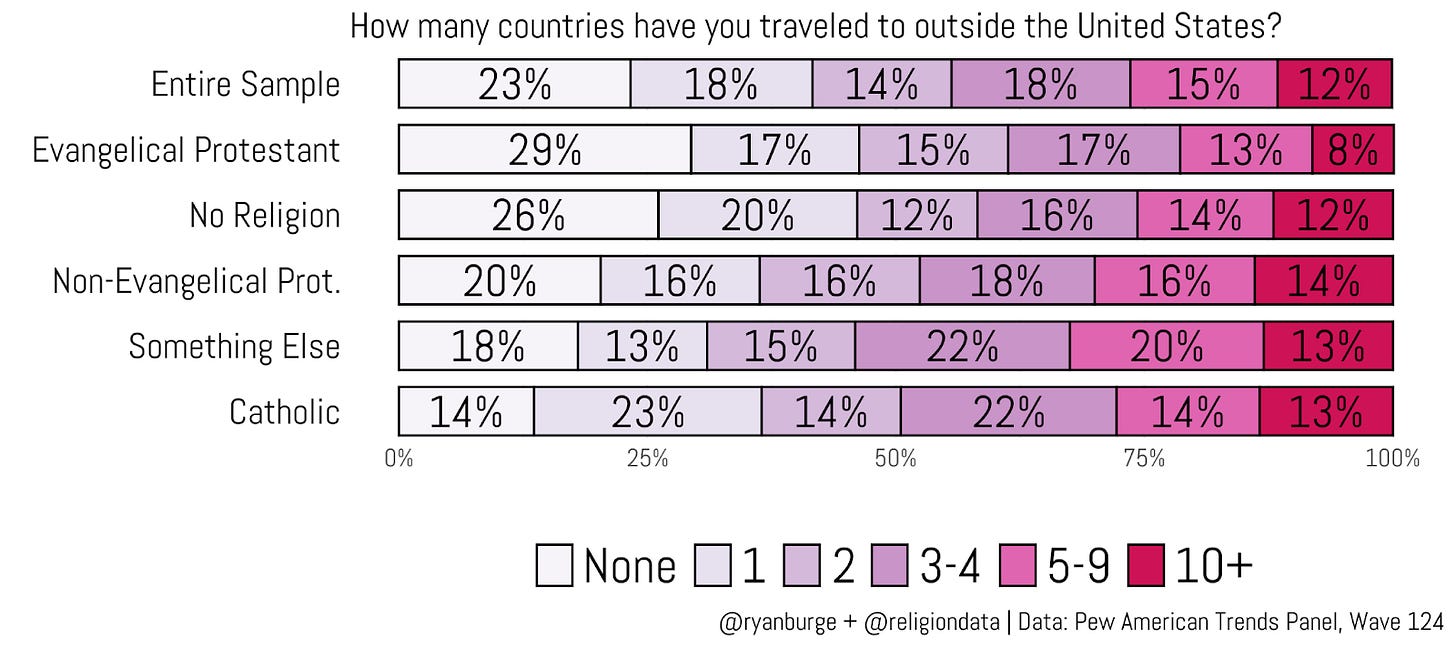
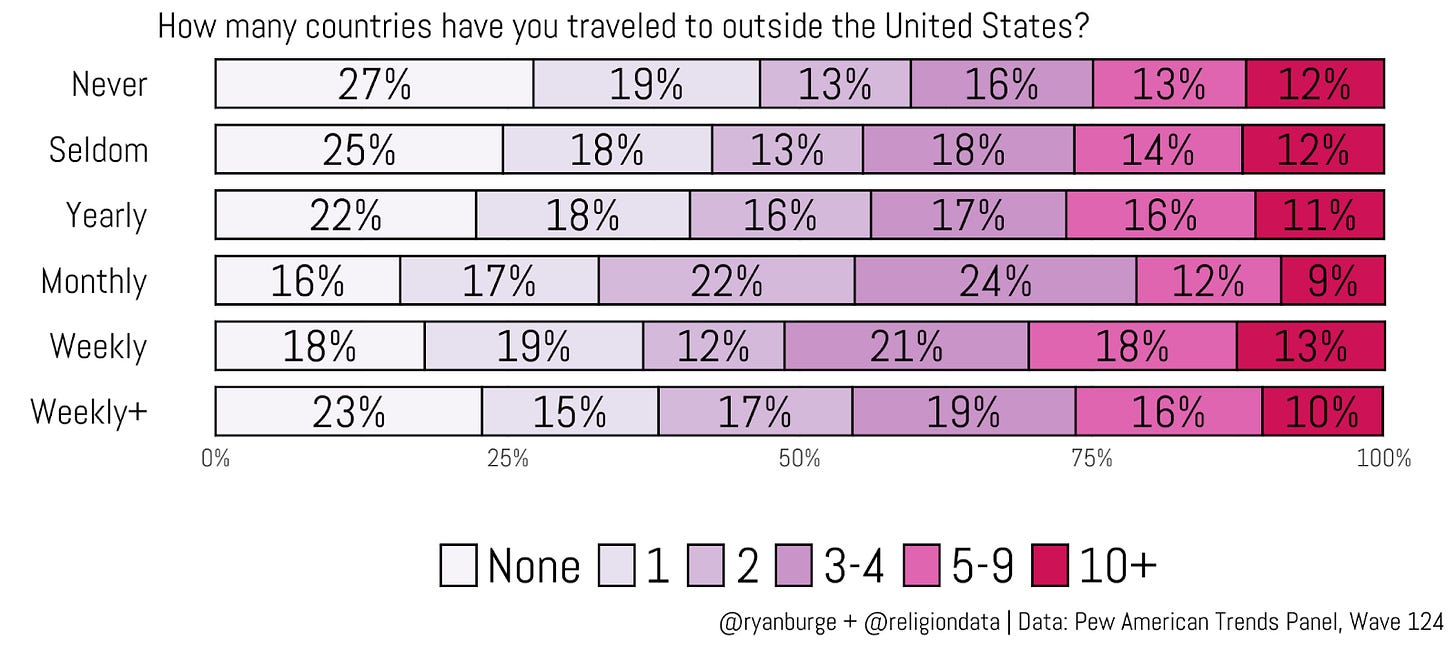
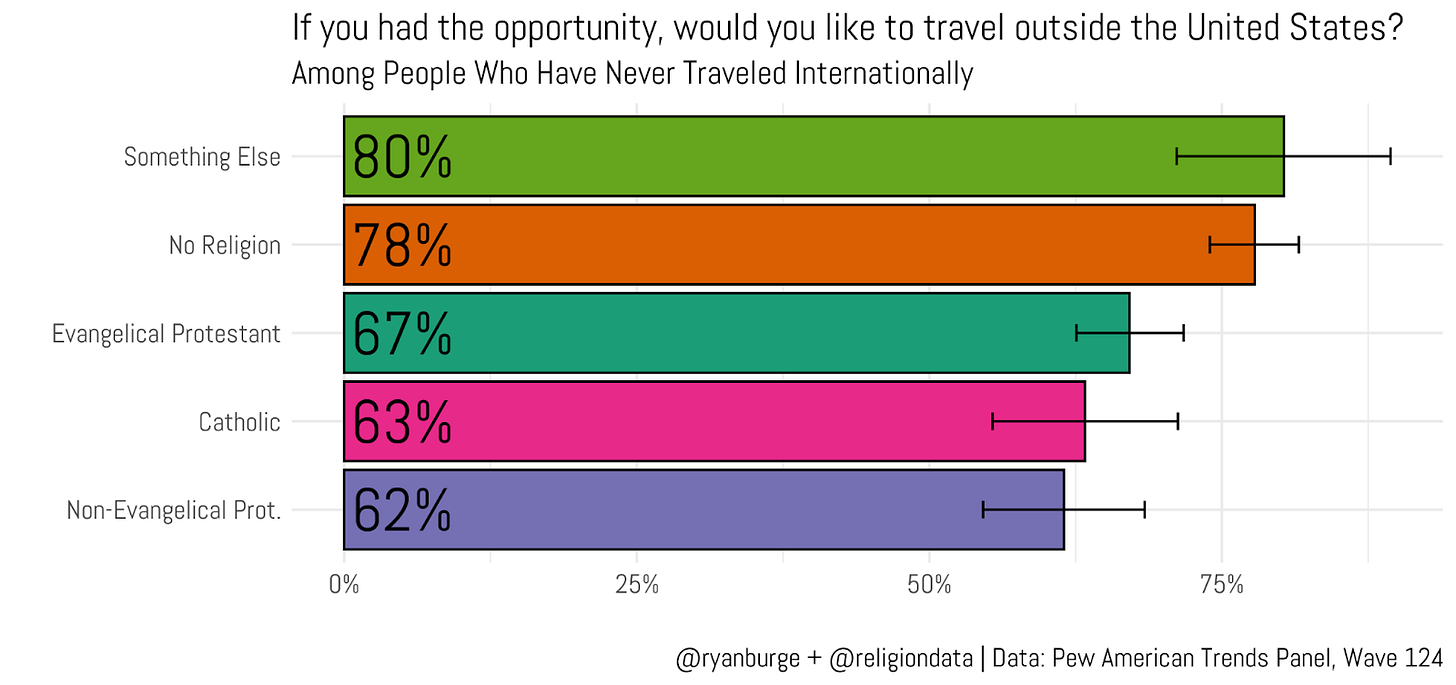
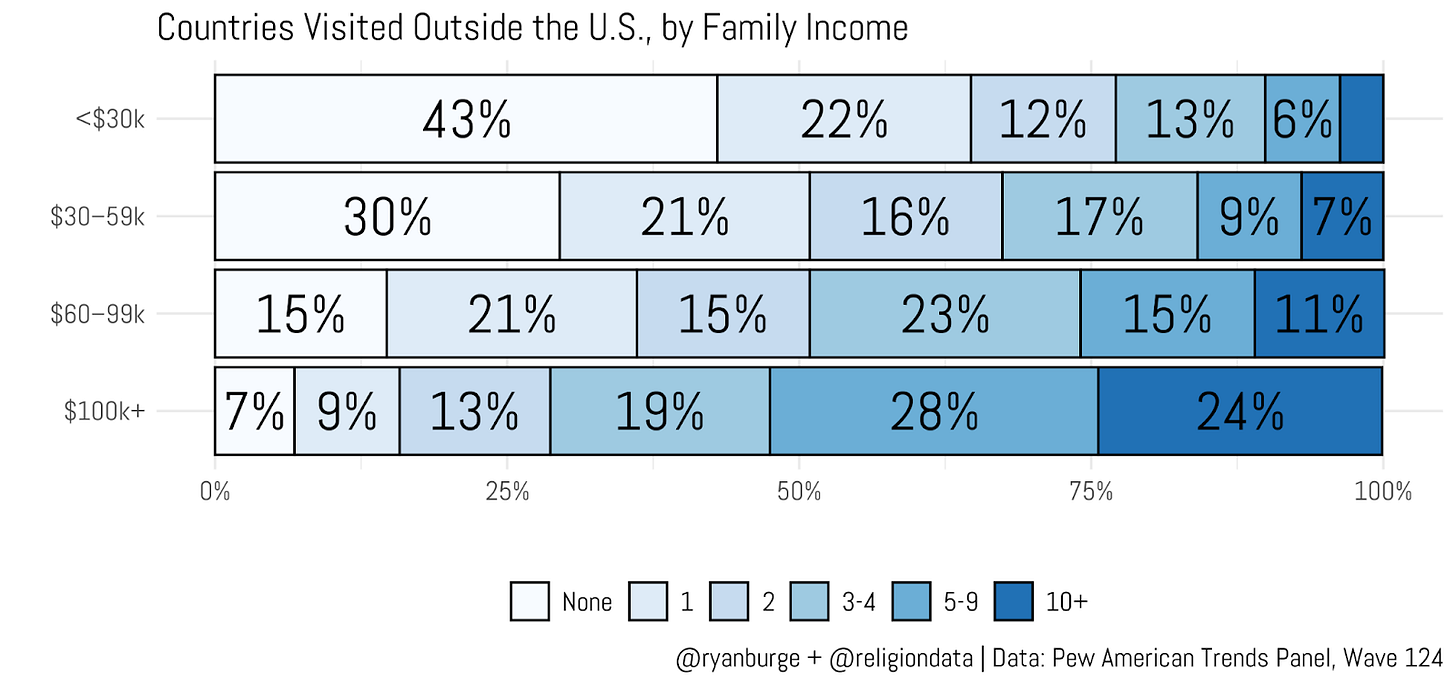
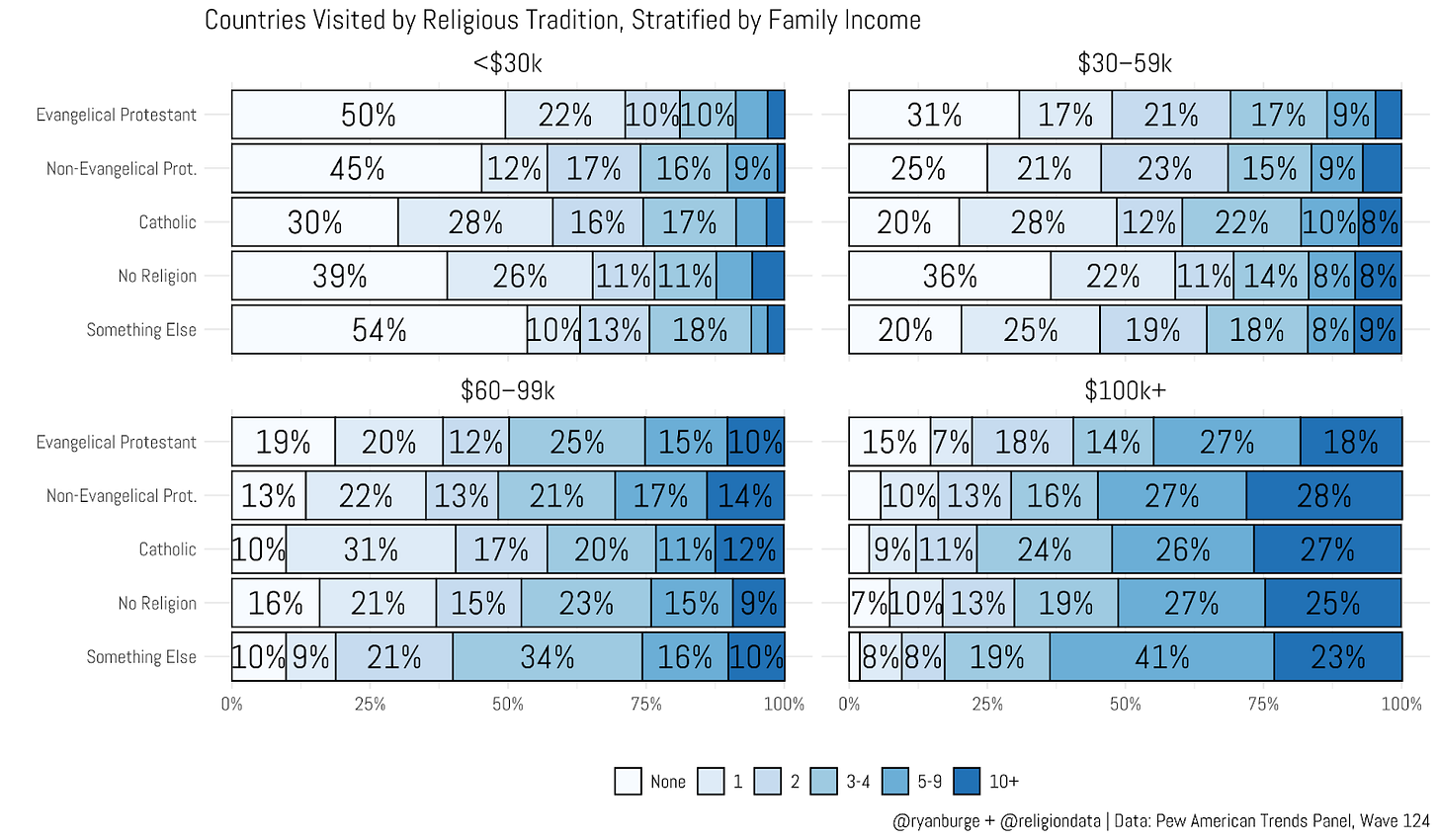
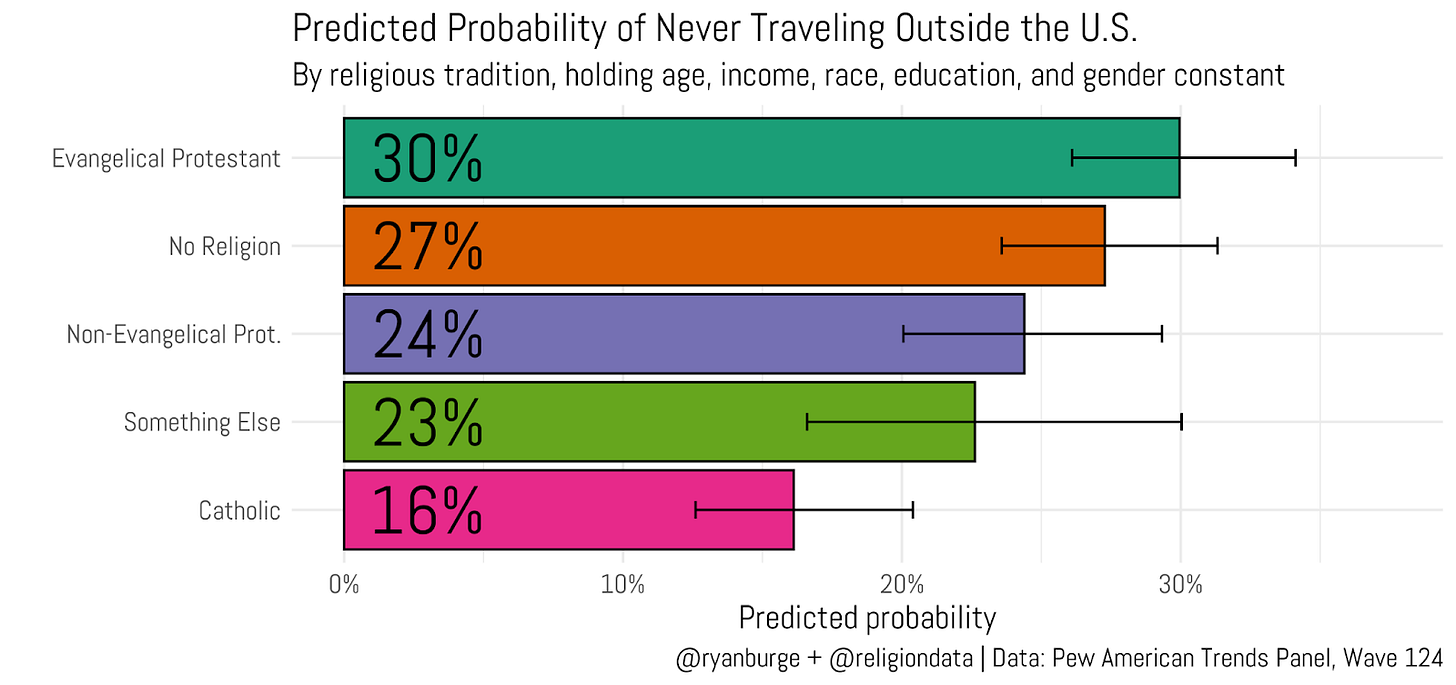

This is GREAT data and I echo the comments about mission type things.
One thing - the headline felt a little confusing for me. Given the current state of things here, I read it as people leaving the US as in moving out of the country because of the political situation rather than just traveling. Just an FYI
A few things happened between 1990 and 2023. Neighboring countries began requiring passports. Cruises became economical and had rules of their flagship sponsors requiring them to port at more than one country, business became global with a highly paid professional class representing their companies. The data do not separate leisure travel, largely voluntary, from business sponsored international travel. In my own medical world, many of my professional meetings have become international ones. So the rise in passports would be expected, even universal for the millions of Americans who live near our northern and southern borders.
Cruise ships seem to span all religions. Corporate hiring does as well, though the engineering and financial jobs requiring formal education that leads to international assignments does not distribute uniformly.